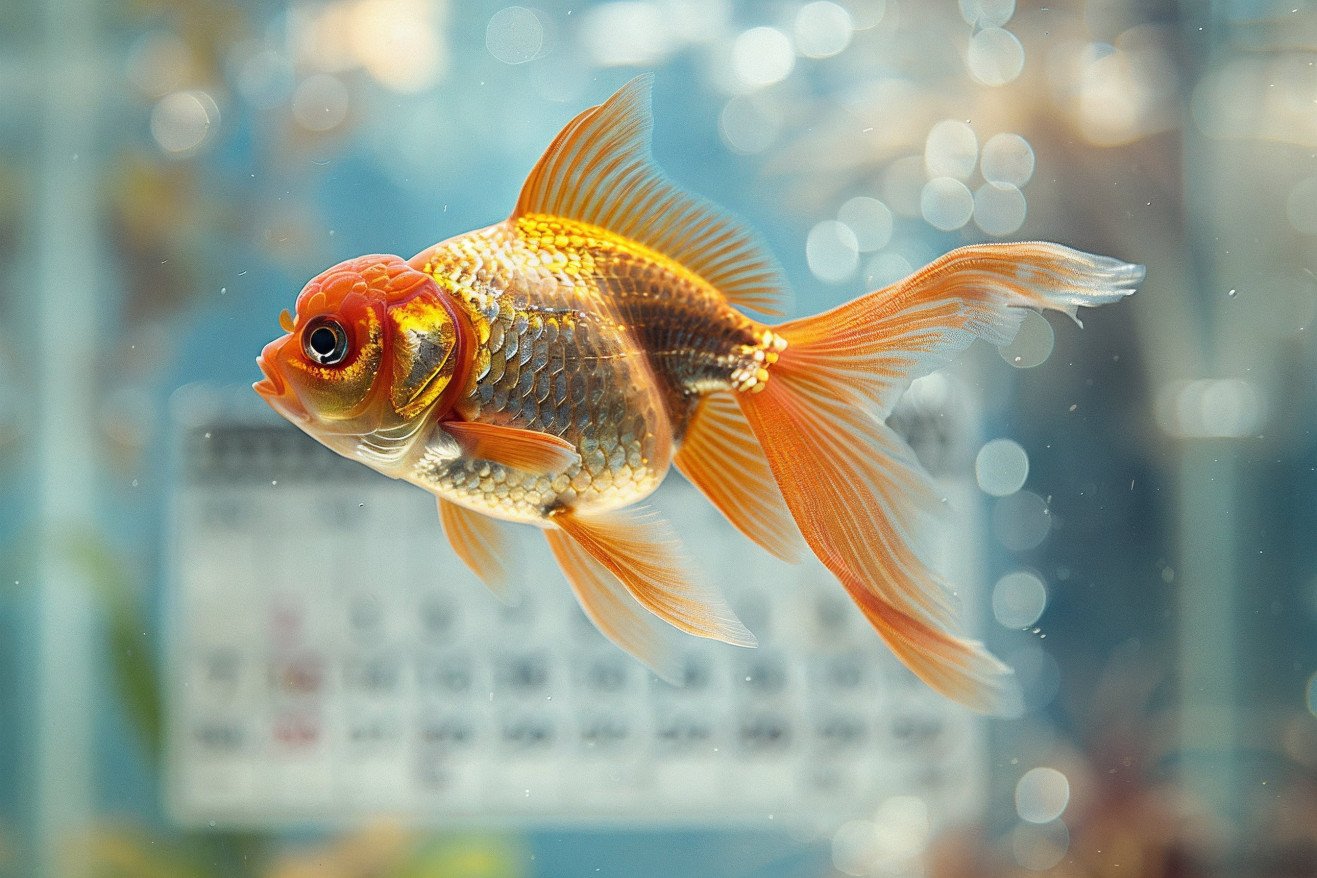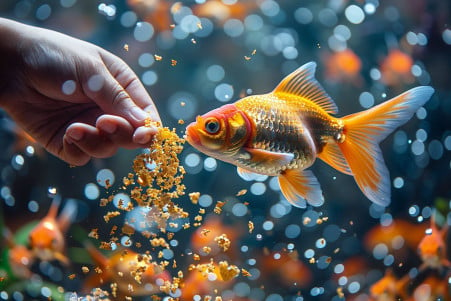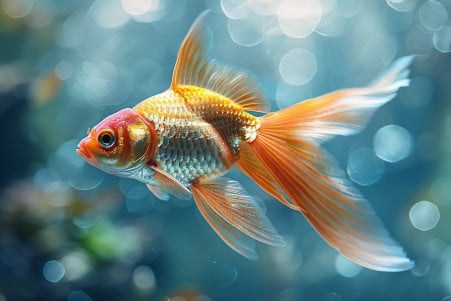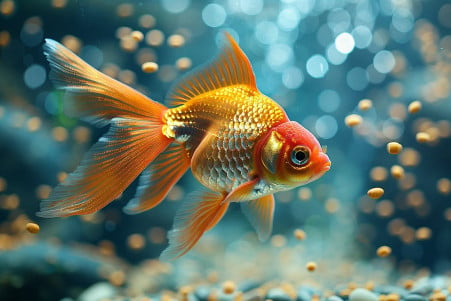How Long Can Goldfish Go Without Food? Know Their Tolerance Levels
12 March 2024 • Updated 10 March 2024

Goldfish are known for their hardiness, but how long can they actually go without eating? In ideal situations, a goldfish can go up to two weeks without food. That said, going without food for longer periods can cause stress and other health problems, so it’s best to stick to a regular feeding routine.
To learn more about how long goldfish can go without food, we’ll look at a number of studies in fields like ichthyology, veterinary science, and animal nutrition. These studies have investigated goldfish metabolism, physiological changes, and how different environmental conditions affect their ability to survive without food. As a result, we hope to offer goldfish owners important information that will help them ensure their fish are healthy and happy.
How long can goldfish go without food?
Factors That Impact How Long Goldfish Can Go Without Food
There are a number of factors that will determine how long goldfish can survive without food. One of the most important is the water temperature, which impacts the goldfish’s metabolism. Higher temperatures increase metabolism, which could mean that goldfish will have a shorter fasting period, while lower temperatures decrease metabolism, enabling the fish to conserve energy and survive longer without food.
Age and size are also important; younger or smaller goldfish may not have the same fasting ability as older or larger goldfish because of differences in their energy reserves and the energy they need to grow.
The fish’s overall health and stress levels are also important to take into account. A fish that is stressed or in poor health is less likely to be able to handle fasting periods, which is why it’s so important to make sure that the fish’s environment is conducive to its well-being.
In addition, the availability of natural food sources, such as algae in a tank or pond, can help goldfish go longer without being fed.
According to a story in The Telegraph, goldfish have been known to survive for months in the aftermath of earthquakes by eating these natural food sources.
Finally, the quality of the water and the maintenance of the tank are important during fasting periods. Goldfish will be able to use their natural adaptations to fasting more effectively in clean, well-filtered water, which will help reduce the risk of disease and stress.
How to Tell If Your Goldfish Is Malnourished
Malnutrition is a major concern for goldfish owners because it can lead to both physical and behavioral changes. Goldfish expert Brenda Rand says that some of the most common signs of malnutrition are behavioral, including a lack of energy and a decrease in normal activities like eating or breeding.
Practical Fishkeeping also notes that a malnourished goldfish can have a sunken, hollow belly and even develop a head that is disproportionately larger than the rest of its body.
Hepper says that malnutrition can also lead to long-term problems, including stunted growth. While stunting isn’t always caused by a lack of food, it can also be caused by a poor diet or the presence of internal parasites.
Make sure your goldfish is getting the nutrients it needs by paying close attention to its feeding habits and body shape, and make sure you’re feeding it a variety of foods.
It’s also important to avoid overfeeding and underfeeding your goldfish, both of which can lead to problems like obesity and malnutrition.
Finally, make sure you’re keeping your goldfish’s tank clean and that the water quality is high. This will help ensure that your goldfish is as healthy as possible. By learning to recognize these signs and making sure your goldfish is eating a balanced diet, you can help make sure malnutrition doesn’t impact your fish.
Goldfish Metabolism and Feeding Needs
Goldfish metabolism is a complex process that is influenced by a number of different factors, all of which impact how much and how often goldfish need to eat. At its most basic level, goldfish metabolism is an aerobic process, meaning that it requires oxygen to convert food into energy.
A study published in PubMed found that goldfish will prioritize aerobic metabolism over metabolic rate depression even in hypoxic conditions. This shows that regular feeding is necessary to meet the energy demands of goldfish.
The metabolic rate of goldfish is impacted by a number of factors, including temperature and age. For example, warmer water can increase the metabolic rate of goldfish, meaning that they will need to eat more often to meet their energy needs.
On the other hand, colder water can decrease their metabolic rate, allowing them to go for longer periods of time without eating. These changes in metabolic rate are the primary factors that determine how long goldfish can go without eating.
For example, a study in PubMed found that goldfish can only depress their metabolic rate under almost anoxic conditions, which shows that they can survive on very little food.
Understanding these factors can help goldfish owners adjust their feeding schedules to their goldfish’s environment and life stage so that they get the right amount of food to meet their needs. This understanding is also important for providing the best care and helping these hardy animals live their best lives.
How Goldfish Survive Starvation: Biological Adaptations
Goldfish have evolved a number of biological adaptations that allow them to survive periods of food deprivation. A study in PubMed found that goldfish were able to maintain their glycogen stores much better than common carp during fasting.
Instead, goldfish relied on liver proteins for basal metabolism and muscle lipids for swimming. The ability of goldfish to maintain glycogen stores and prioritize protein metabolism during aerobic exercise such as swimming is likely the reason they can survive for so long without food.
The study also found that goldfish were able to alter their metabolism to maintain critical swimming speeds during fasting, showing that they can adapt to meet their energy requirements during periods of food deprivation.
These adaptations likely enable goldfish to forage and find other food sources in their environment, allowing them to survive when their normal food supply is cut off.
As a result, these physiological adaptations demonstrate the flexibility of goldfish in energy use and their incredible survival skills during periods of food deprivation. This knowledge of goldfish’s metabolic flexibility can help inform the best ways to care for goldfish, especially when they can’t be fed regularly.
How to Make Sure Your Goldfish Are Taken Care of While You’re Away
If you’re going to be away from home for a period of time, make sure you plan ahead for your goldfish’s dietary needs. Automatic feeders are a great option that will dispense food at regular intervals, ensuring that your fish are fed but not overfed. You can even set the feeder to the same schedule that your goldfish are used to, according to Fish Keeping Wisdom.
Another option is to use slow-release food blocks, which will dissolve over a few days, releasing food for your goldfish. However, Fish Keeping Wisdom warns that these blocks can be overused and can negatively impact the water in your tank.
Make sure that you also prepare the tank itself. Clean the tank thoroughly before you leave and consider having the water quality tested. Clean water is especially important when your fish will be eating less than usual.
To avoid overfeeding your fish before you leave, which can lead to dirty water and health problems, only feed them what they can eat in a few minutes, according to Hepper.
If you’re worried about leaving your goldfish alone for a few days, you can also consider asking a friend or family member to stop by and feed your fish. Just make sure that you’re very clear about how much food they should give your fish and how often to avoid overfeeding.
By taking these steps, you can make sure that your fish are well taken care of while you’re away, giving you peace of mind to enjoy your time off and making the transition back to your regular care routine as smooth as possible.
Goldfish Fasting Revisited: Takeaways and Best Practices
The above has shown that goldfish are extremely resilient animals, capable of surviving for up to two weeks without food in the right conditions. However, while goldfish have proven they can survive without food for extended periods of time, it’s also clear that feeding them regularly is important for their health and to prevent unnecessary stress.
Studies on goldfish metabolism, including Hepper’s, have demonstrated that a number of factors, including temperature, and the age and health of the goldfish, can impact how much they need to eat. This helps us better understand the nuances of their dietary needs and the importance of adjusting feeding schedules based on specific situations.
Meanwhile, research has also shown that goldfish have a number of physiological adaptations that help them survive when food is scarce, including the ability to conserve energy and the ability to prioritize other food sources.
It’s up to pet owners to make sure that they’re taking care of their goldfish in a way that prioritizes their well-being, and that means making sure that they’re well-cared for and that we’re continually learning about their needs. By taking this kind of educated approach to caring for goldfish, we can make sure that our pets are healthy and happy in the aquariums we provide for them.


